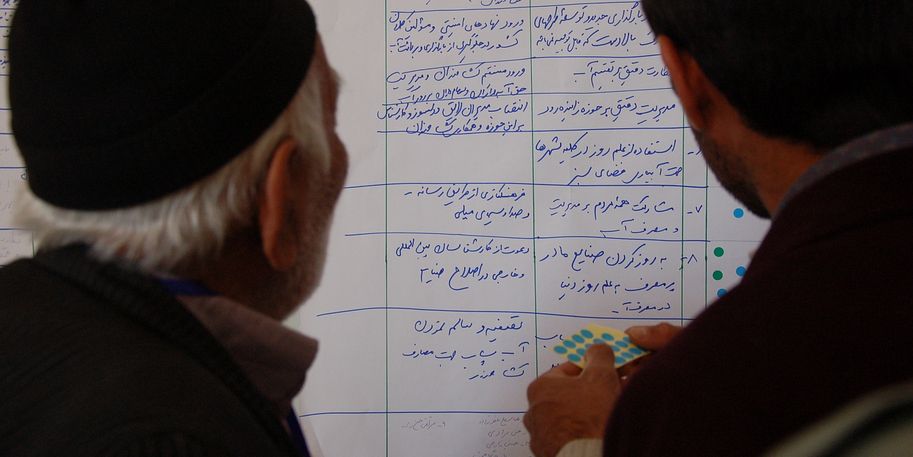The agricultural sector provides the livelihood for more than a million people. Without their commitment the efforts to use water more efficiently will not lead to satisfactory results. Local farmers and their representatives are therefore actively be involved in the development of strategies for optimised land use. A workshop was carried out by inter 3 on December 11th and 12th 2016 in Isfahan, using a locally adapted form of Citizens’ Juries methodology. Around 60 farmers and farmers’ representatives responded to our call for participation.
The Citizens’ Jury approach was developed in Germany and has been successfully applied in various countries. According to the methodology, the participants were divided into two large groups (farmers and their representatives). Stakeholders gave input from opposing perspectives concerning a specific issue in the field of for feasible farming alternatives in the Zayandeh Rud catchment. These include measures for increasing economic water productivity (more Rial revenue per litre of water) and for increasing crop productivity (more kg yield per litre of water). The participants discussed the issue in small groups, agreed upon their main statements and presented their results. Every participant was invited to weigh up the arguments. The members of the small groups changed during the day in order to avoid individuals dominating talks, and the stakeholders are not present at this time.
The participants’ feedback was very positive. Each topic was discussed in a very committed and vivid way. Interesting discussions took place not only during the presentation of the small groups’ results but also during the workshop breaks. The dialogue between farmers of the neighboring provinces Chaharmahal-va-Bakhtiari und Isfahan – i.e. upstream and downstream Zayandeh Rud – was assessed as valuable in particular. At the end of the day, the workshop also helped reducing tensions between farmers that result from water scarcity.
The results of the discussions will be summarized in a citizens‘ report and handed over to the political decision-makers for consideration. The recommendations will provide a well-grounded basis for future land use strategies and measures. The workshop was part of the “Integrated Water Resources Management Zayandeh Rud” project which has been funded by the BMBF since 2010. The “Women’s Association Against Environmental Pollution” supported inter 3 as moderators and facilitators.

![[Translate to English:] Porträt von Dr. Shahrooz Mohajeri](/fileadmin/_processed_/e/2/csm_21c969_ls_weiss-162_cb8e5e877b.jpg)